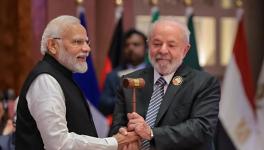Two Elections, Two Results: Brazil and the US Elections
Two of the largest countries in the western hemisphere – Brazil and the US – had their elections recently. While in Brazil, the centre left candidate Dilma Rouseff won against Serra, the centre right candidate – the far right in US made considerable gains against the centrist Democrats. I am not sure whether to call the democrats as centre right or just centre, considering the shift of this centre to the right in the US. Brazil elected not only their President but also their legislature; the US mid term elections was only to the House of Representatives and a section of the Senate and the Governors.
While this by itself does not constitute a change of guard in US politics, it may very well limit what Obama can do and also push him in directions he himself may not have wanted to go.
The Brazilian elections: continuing with Lulismo
The Brazilian elections first. Dilma Rouseff, the candidate of Lula's PT (Workers Party) faced a run-off against José Serra, PSDB (Brazilian Social Democracy Party)with a comfortable margin of 56 to 44%. The run-off took place as Dilma did not get more than 50% votes in the first round. An unexpected strong running by an otherwise less known candidate, Marina Silva, a former minister in Lula's cabinet, backed by a strong evangelical section calling for ban on abortions, got about 20% votes, leading to the run-off. The voting figures were very similar to Lula's two election victories. Lula, the charismatic figure in Brazilian politics commanding an 80% popular support, could not run again under Brazilian constitution, as he has already held two presidential terms.
One consequence of the anti abortion lobby's campaign was that both Dilma and Serra took an anti abortion stand in the run-off. However, on all other matters, Serra's platform was very different from Dilma's – he campaigned for aligning Brazil with the US policies in the region, supported the coup in Honduras, accused Venezuela of harbouring Farc, (the guerilla group) in Colombia and charged Bolivia of being "complicit" in drug trafficking. This was backed up by a virulent campaign against Dilma for not really being against abortion and a “baby-killer,” and on her “terrorist” past. Dilma was a militant activist against the military dictatorship in Brazil in the 60's. That she was fighting against an illegal military regime at a time in which all political activity was banned, was of course not mentioned in this campaign. The kind of hate campaign unleashed against Dilma is very similar to what the right in the US uses against all left wing figures in the US, now spilling over to their campaign against Obama as well.
Lula's two terms is widely acknowledged to have changed the landscape of Brazilian politics. His programs, particularly in his second term, have lifted an estimated 25 million of the country's poor into the consuming middle class. He greatly expanded direct cash transfers to the poorest sections – the Bolsa Familia program-- earning him and PT a support in this section that they never formerly enjoyed. More importantly, it broke the back of the older political caudillos, who were based on the landed aristocracy. Both the senate and the House of Representatives are now controlled by the PT and their allies, something that Lula never enjoyed in his eight years.
The problem of Lulismo (http://upsidedownworld.org/main/brazil-archives-63/2737-brasil-toward-t…), as some have started calling it, is that it is still based on an extractive economy. Petrobras, as the crown jewel, has played a key role in the Brazilian economy. Its capitalisation today at $220 billion is exceeded only by Exxon, valued at 290 billion, and ahead of Microsoft and Wal Mart. An euphoric Lula spoke about Petrobrás’ success, “I spent my whole life saying I was a socialist, and now I’ve made the largest capitalization the capitalist world has ever known.” In Latin America, the left-centre and also more avowedly left Governments, have all taken to using their natural resources – be it oil or other mining and forest resources – to chart a course of relative independence from the US. They have also used these resources to fund a part of their pro-poor and welfare measures. While the break in external policy terms is quite sharp, as is their internal thrust on welfare, there is however no corresponding break with the financial elite. In Brazil, as in Venezuela, the financial elite control not only the banks but also much of the media. What has been broken is the political power of the landed rich and the financial elite, who ran Latin America at the behest of the US. This is what Serra represented and this is what is currently out of favour with much of the electorate. However, the tension between the movements that are opposed to this extractive mode of capitalist expansion and the thrust of the politics of Lula in Brasil or a Correa in Ecuador (ttp://newsclick.in/international/prof-chesa-boudin-coup-ecuador) still remain.
The Brazilian elections once again confirms that Latin America is undergoing a sea change. Whether it is Brazil, with a more centre left configuration, or others, such as the more leftist formations in Bolivia or Venezuela, the total political control that the US exercised over Latin America's politics is over.</p>
Obama and the US midterm elections
Though the US remains as the strongest military and political power, its undisputed writ is no longer running in much of the world. The days of a single super hegemon, is now over, a lesson that the right in the US refuses to learn. Unfortunately, the recent mid term elections in the US show that the right has been able to use this weakening of the US as a weapon against the Obama presidency. Unless Obama is able to steer a different course, his presidency will now be held hostage to a resurgent right, a scant two years after its crushing defeat in the last elections.
It is difficult to understand the depth of the right-wing hatred against Obama sitting anywhere outside the US. The right is virulently anti Obama – calling him a Muslim, a socialist-communist, and many other names. A significant section(known as birthers) of the US population ( a CNNpoll put this at 25% of the US population) and a majority of the Republicans believe that Obama does not qualify to be US president -- as he was born outside the US. This despite overwhelming evidence to the contrary.</p>
Much of this hatred is not explicable unless we look at the deeper political currents in the US. Racism is very much a part of the US make-up – strong civil rights movements of the 60's not withstanding. We have only to go to a few right wing blogs to see what is there. Obama being African American does not sit well with middle America. This is the continuity of Jim Crow politics, which not too long ago believed it could have segregation for ever and lynched blacks if they got too “uppity”. It is this same racism that is feeding into Islamophobia today. This is the section which wants the state to cut all state expenditure except for prisons, internal security and foreign wars. The argument for supremacy of the markets is also for white supremacy – blacks are supposed to be all on welfare. So cutting away all state support for Medicaid, the new health care and other welfare measures, expresses the resentment that a section of the Americans have against affirmative action. The beauty of this form of attack on affirmative action is that it can always dress itself up as anti big government. Its pro corporate and anti poor, anti black character can be hidden under this cover, very much the way elite, anti-reservationists do in India.
Obama is a moderate politician in American terms. He perhaps genuinely believed that there was a space for bipartisan politics in the US and it was possible to run the US administration on a broad consensus. The problem here is that if the US imperium is waning as also its economy, this is not a phase of politics likely to promote consensus. This is the time that politics fractures and polarises, as old solutions no longer work. It is no longer possible for the US to indefinitely pass on the burden of the crisis to rest of the world. It is not possible to have huge number of bases outside the US, finance major wars and yet have a balanced budget. If the US continues its imperial overreach, no amount of military strength can help to shore up the dollar and its economy.
Obama had the option to continue his campaign against Wall Street and for Main Street after his becoming the President. Instead, he inducted the old Bush team as his defence and economic advisers. Not surprisingly, he coupled a weak stimulus with shoring up of Wall Street. The US financial institutions had become to big to fall; they have successfully worked out their strategy of privatising profits and socialisation of losses. The banks recovered quickly, sucking in huge amounts of public funds, then going on to declare large profits and even larger bonuses for the bankers. The contrast with the working people was stark – job losses mounted with the stimulus barely staving off a worse meltdown, while the fat cats continued to get fatter.
In a website, a financial trader and veratinly no leftist has written (http://oilprice.com/Finance/Economy/What-the-Election-Means-for-US-Economic-Policy.html) on the irony of this election. “The party that presided over the biggest increase in the deficit in history, from $5 trillion to $10 trillion during 2000-2008, is now charged with reducing the deficit.” Further, “The party with the worst job creation record in a century is now in charge of job creation. There were 23 million jobs created from 1992-2000. There were only 1 million created during 2000-2008 when the population grew by 22 million.”
Today, the right-wing Republicans who created the crisis in the first place -- through Reagan and George Bush tax cuts -- are the most vociferous against Obama's economic policies. They are using the anger of the continued loss of jobs and incomes to chip away at welfare measures including the newly introduced healthcare measures. Obama's move to placate the Republicans has boomeranged – he now officially owns the policies that Bush administration pursued; apart from owning the war in Iraq and in Afghanistan. Effectively, he has allowed the Republicans to escape from the hole that they had dug themselves into after 8 years of Bush administration.
For Obama to revive his presidency, he will have to take a hard look at the policies he wants to pursue. If he continues with trying to evolve a consensus, he will be a complete prisoner of the Republicans. And this is a bunch of Republicans who have themselves been captured by the hard right.
A small sample of this right-wing mobilisation, though in cyber space, is visible from the interview newsclick has done with Bernadine Dohrn (http://newsclick.in/node/1913), a pet hate object of the American right for her past as a founder member of Weatherman and continuance as a radical activist. A right-wing site snipped a part of this interview and posted it as an example of the America-hating left and received an astounding 47,000 hits in 3 days! All of this spouting venom, almost entirely unprintable. The hard right is active and willing to move.
One of the signal weaknesses in US politics is the absence of an active and organised left. There is no point in producing brilliant analysis of the problems unless they also promote organised resistance. Without this mass mobilisation, there will be no shift in American politics. While the youth who had been galvanised by Obama during his presidential campaign largely stayed away, the right, however fraudulent its grass root mobilisation, was active. And let us also not underestimate the change that the US Supreme Court has recently introduced into campaign financing – corporations are free to donate money to candidates without limits. In some of the constituencies, the Republicans outspent the Democrats by huge amounts. Even within the Democrats, the pro corporation wing, which is the major section anyway, has also become the more powerful one in spending terms.
Either Obama goes back to the constituency that elected him, or he seeks consensus with the hard right that will now call the shots in legislative terms. He has very little wiggle room. The consequences for the world may also be significant. Obama may very well take a far more aggressive military strategy over Iran, hoping to recoup his electoral standing. A war is always good for improving the ratings. In any case, his Palestine agenda, if ever there was one, is now effectively over.
The tragedy in all this he had raised enormous hope around the world. The midterm elections have now put paid to all this. We are likely to land up with a more refined set of Bush policies, both externally and internally after this elections. This is the only consensus that he will be able to get – his bowing to the Republican will.
Get the latest reports & analysis with people's perspective on Protests, movements & deep analytical videos, discussions of the current affairs in your Telegram app. Subscribe to NewsClick's Telegram channel & get Real-Time updates on stories, as they get published on our website.
























